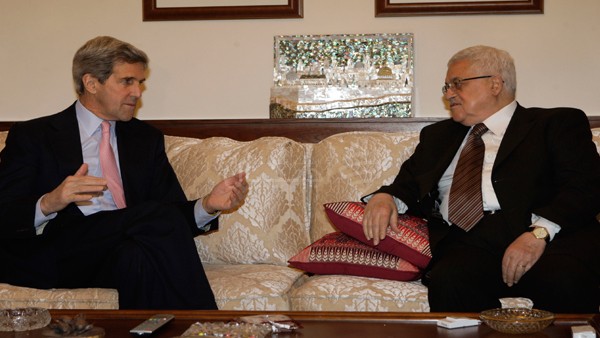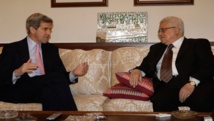Speaking late Thursday at the Washington Institute think tank, Indyk said although the two sides both showed "flexibility" it was clear they "do not feel the pressing need to make the gut-wrenching compromises necessary to achieve peace."
In the end despite nine months of "serious and intensive negotiations," Indyk said it was "easier for the Palestinians to sign conventions and appeal to international bodies in their supposed pursuit of 'justice.'"
"It is easier for Israeli politicians to avoid tension in the governing coalition and for the Israeli people to maintain the current comfortable status quo," said Indyk, a former US ambassador to Israel.
"It is safe to say that if we the US are the only party that has a sense of urgency, these negotiations will not succeed."
Should the peace talks resume however, Kerry believes both sides must work on the future contours of a Palestinian state and security arrangements for Israel alongside the other core issues such as refugees and Jerusalem.
Indyk pointed to "unprecedented" work by General John Allen on how to secure Israel's security, as well as a willingness by the Palestinian president Mahmud Abbas to put the security of a future Palestinian state in US hands to overcome Israeli distrust.
"Once a border is agreed each party would be free to build in its own state," Indyk argued, highlighting the tensions caused during the past months by announcements of Israeli plans for more than 12,800 new settlements in the occupied West Bank and east Jerusalem.
The top US negotiator, who spent hours locked in rooms pouring over documents, voiced concern that the settlement movement could one day "drive Israel into an irreversible binational reality."
"Rampant settlement activity -- especially in the midst of negotiations -- doesn't just undermine Palestinian trust in the purpose of the negotiations; it can undermine Israel's Jewish future," Indyk warned.
"If this continues, it could mortally wound the idea of Israel as a Jewish state -- and that would be a tragedy of historic proportions."
But he insisted that despite moments of frustration and humiliation felt on either side, he had also witnessed "moments of genuine camaraderie and engagement in the negotiating room to find a settlement to these vexing challenges."
Recalling how the talks which led to the 1979 Israel-Egypt peace treaty broke down for five months, he voiced hope negotiations would resume soon.
"When they are ready, they will certainly find in Secretary Kerry and President (Barack) Obama willing partners in the effort to try again -- if they are prepared to do so in a serious way," he added.
-----------------------------------------------------------------------------------
In the end despite nine months of "serious and intensive negotiations," Indyk said it was "easier for the Palestinians to sign conventions and appeal to international bodies in their supposed pursuit of 'justice.'"
"It is easier for Israeli politicians to avoid tension in the governing coalition and for the Israeli people to maintain the current comfortable status quo," said Indyk, a former US ambassador to Israel.
"It is safe to say that if we the US are the only party that has a sense of urgency, these negotiations will not succeed."
Should the peace talks resume however, Kerry believes both sides must work on the future contours of a Palestinian state and security arrangements for Israel alongside the other core issues such as refugees and Jerusalem.
Indyk pointed to "unprecedented" work by General John Allen on how to secure Israel's security, as well as a willingness by the Palestinian president Mahmud Abbas to put the security of a future Palestinian state in US hands to overcome Israeli distrust.
"Once a border is agreed each party would be free to build in its own state," Indyk argued, highlighting the tensions caused during the past months by announcements of Israeli plans for more than 12,800 new settlements in the occupied West Bank and east Jerusalem.
The top US negotiator, who spent hours locked in rooms pouring over documents, voiced concern that the settlement movement could one day "drive Israel into an irreversible binational reality."
"Rampant settlement activity -- especially in the midst of negotiations -- doesn't just undermine Palestinian trust in the purpose of the negotiations; it can undermine Israel's Jewish future," Indyk warned.
"If this continues, it could mortally wound the idea of Israel as a Jewish state -- and that would be a tragedy of historic proportions."
But he insisted that despite moments of frustration and humiliation felt on either side, he had also witnessed "moments of genuine camaraderie and engagement in the negotiating room to find a settlement to these vexing challenges."
Recalling how the talks which led to the 1979 Israel-Egypt peace treaty broke down for five months, he voiced hope negotiations would resume soon.
"When they are ready, they will certainly find in Secretary Kerry and President (Barack) Obama willing partners in the effort to try again -- if they are prepared to do so in a serious way," he added.
-----------------------------------------------------------------------------------









 Home
Home Politics
Politics











